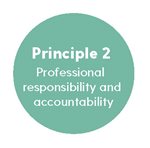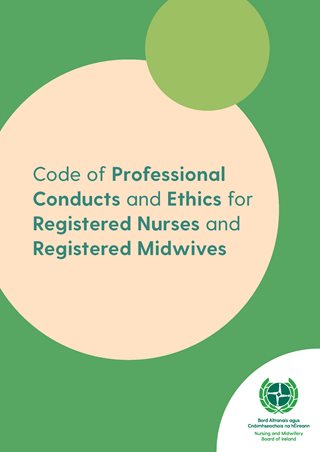Principle 2: professional responsibility and accountability

This principle focuses on professional responsibility and accountability, personal and professional integrity, and advocacy. It also refers to professional boundaries, insurance and conscientious objection.
Values
- Nurses and midwives are expected to show high standards of professional behaviour.
- Nurses and midwives are professionally responsible and accountable for their practice, attitudes and actions including inactions and omissions.
- Nurses and midwives recognise the relationship between professional responsibility and accountability, and their professional integrity.
- Nurses and midwives advocate for patients’ rights.
- Nurses and midwives recognise their role in the appropriate management of healthcare resources.
Standards of conduct
- You must act within the law and follow Nursing and Midwifery Board of Ireland rules and regulations.
- You should abide by the ethical and professional values and the standards of conduct and practice in the Code and in our other standards and guidance.
- You are responsible and accountable for your decisions and actions, including inactions and omissions, in your practice.
- You have a duty to protect the health of your patient, your own health and safety and that of the wider community. If, in extreme infectious clinical situations where adequate and sufficient protective clothing is not available, it is your responsibility to raise the matter immediately with your manager. If the matter is not resolved satisfactorily, you may need to make difficult decisions quickly to preserve the safety of the patient, your own personal safety and the safety of others. Decisions should be made in so far as is possible with your colleagues while also taking account of local and national guidelines and protocols.
- You should act as an advocate on behalf of patients who require you to do so to ensure their rights and interests are protected.
- If you have a conscientious objection based on religious or moral beliefs which is relevant to your professional practice, you must tell your employer and, if appropriate, tell the patient as soon as you can. If you cannot meet the patient’s needs because of this objection, you must talk with your employer and, if appropriate, talk to the patient about other care arrangements. If you have a conscientious objection in relation to carrying out or participating in a woman’s termination of pregnancy, you are required by law to make arrangements for the transfer of care of the pregnant woman as may be necessary, to enable the woman to avail of the termination of pregnancy concerned.
- Even if you have a conscientious objection, you must provide care to a patient in an emergency where there is a risk to the patient’s life.
- You should be aware of your professional responsibility when using social media.
- You should keep professional boundaries with patients. Professional boundaries set the limits of the therapeutic relationship including acceptable behaviour between yourself and the patient.
Your professional position must never be used to form a relationship of an emotional, sexual or exploitative nature with a patient, their spouse, partner or close relative.
- You must not ask for or accept loans of money from patients.
- You must not accept any gifts or favours from patients, healthcare and pharmaceutical companies that could:
- reasonably give the impression that you are providing someone with preferential treatment
- influence your professional integrity
- cause a conflict of interest – where your private interests might interfere with your professional responsibility to your patient
- You should abide by your employer’s policy about the acceptance and reporting of gifts.
- If you are promoting or advertising a product or service for commercial purposes, you should be aware of your professional, ethical and legal obligations to provide accurate and impartial information.
- You should use healthcare resources effectively in your practice setting and respect patients’ and employers’ property.
- You are responsible and accountable for your own health and wellbeing. If you become aware that your own health is affecting your ability to practise safely, you must get help to manage your condition.
- You are responsible for ensuring you have professional indemnity insurance. Patients have a right to expect you to hold this insurance in case there is a claim of professional negligence against you.
Supporting guidance
Professional Clinical Indemnity Insurance
f you are employed in the public health service or in certain voluntary organisations, you are protected by the Clinical Indemnity Scheme (CIS).
If you are working in the private sector, you may be covered by your employer’s insurance.
The CIS provides insurance cover for nurses and midwives working in the public health sector and certain voluntary organisations as listed in SI No. 63 of 2003 National Treasury Management Agency (Delegation of Functions) Order 2003 and National Treasury Management Agency (Delegation of Functions) (Amendment) Order 2007.
In the interest of patient safety and protecting the public you must ensure that you have professional indemnity insurance.

Code of Professional Conduct and Ethics for Registered Nurses and Registered Midwives
.pdf Download (279KB)
Download